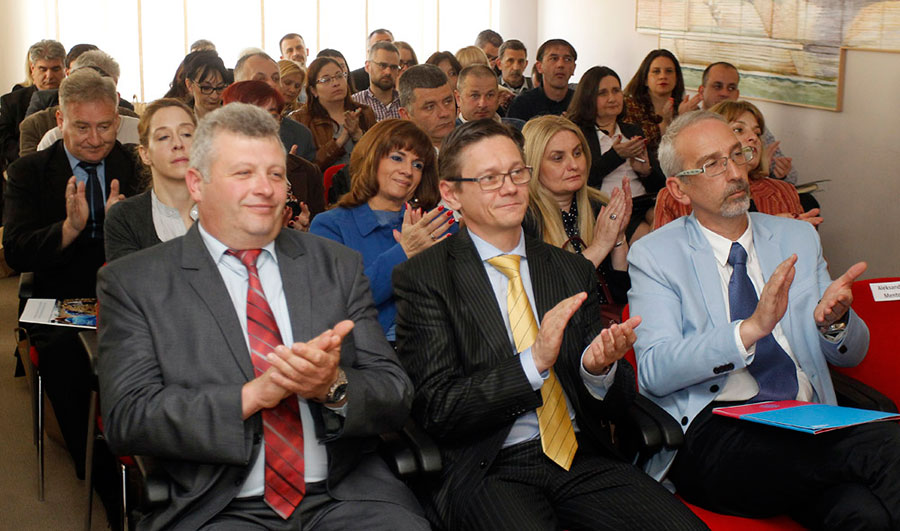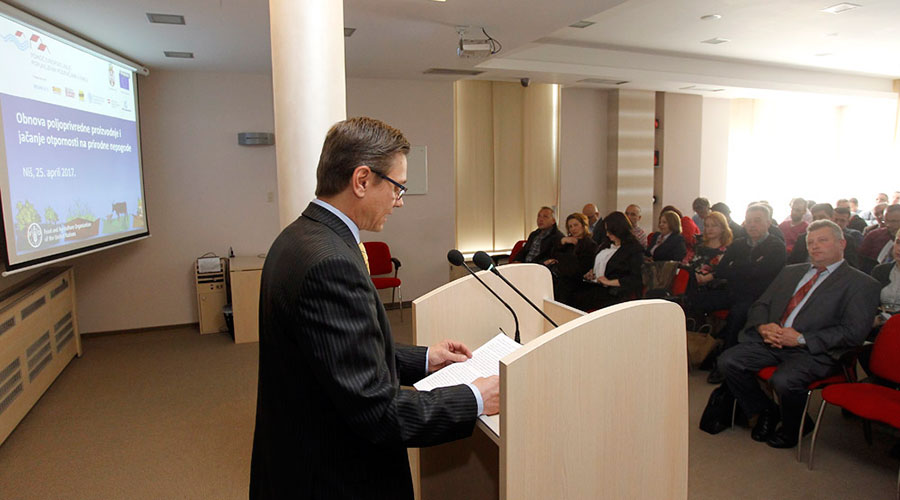Since 2014 to date, the European Union has supported over 36,000 farmers affected by floods and other natural disasters through the UN Food and Agriculture Organisaton (FAO). The aid worth EUR9.5 million in the form of seeds, fertilisers, animal feed, seedlings, greenhouses and agricultural machinery has been delivered timely to the most affected households, or more than 140,000 people, through the European Union Assistance for Flood Relief Programme. These are some of the conclusions reached during the conference “Restarting agricultural production and strengthening resilience to natural disasters” held today in Nis to mark the closure of the FAO project aimed at supporting farmers.
“In 2014 we faced catastrophic natural disasters and the European Union immediately offered assistance through the FAO for the most vulnerable agricultural households. And with support from these reliable partners, we have managed to restart the production,” said the State Secretary of the Ministry of Agriculture and Environmental Protection Zeljko Radosevic.
Over 36,000 agricultural households or some 140,000 people from over a thousand communities, received assistance packages to restart their activities, whereas more than a thousand farmers underwent training in adapting their production practices to climate change.
 From September 2014 to April 2017, thanks to EU donation of EUR9.5 million allocated from IPA 2012 and IPA 2014 funds, the FAO delivered 2,915 tons of seeds, 7,848 tons of fertilisers and 3,152 tons of animal feed (which required 556 25-ton curtainsiders), 2.4 million fruit seedlings, 952 greenhouses, 1,456 livestock headages, 1,190 beehives and 542 units of agricultural machinery (irrigation pumps, two-wheel tractors, tractor attachments etc.).
From September 2014 to April 2017, thanks to EU donation of EUR9.5 million allocated from IPA 2012 and IPA 2014 funds, the FAO delivered 2,915 tons of seeds, 7,848 tons of fertilisers and 3,152 tons of animal feed (which required 556 25-ton curtainsiders), 2.4 million fruit seedlings, 952 greenhouses, 1,456 livestock headages, 1,190 beehives and 542 units of agricultural machinery (irrigation pumps, two-wheel tractors, tractor attachments etc.).
“With more than EUR170 million, the European Union is the biggest donor for flood relief in Serbia. Through our joint efforts and thanks to substantial funding, we have managed to bring life back to areas left without any hope. So, apart from the assistance delivered to farmers, over 2,500 family homes have been reconstructed or constructed and more than 1,170 business people have received support. Also, numerous schools, hospitals and kindergartens have been reconstructed. We are currently supporting projects aimed at flood prevention, through regulation and reconstruction of riverbeds. We are putting irrigation pumps in service and rehabilitating landslides and reconstructing road infrastructure,“ said the Head of Operations III Richard Maša.
The line Ministry of Agriculture and Environmental Protection, the Public Investment Management Office and agricultural advisory and expert services all supported the activities aimed at farmers who had suffered the damage, with local self-governments as the key partners – 41 towns and municipalities in West, Central and South Serbia. In order to increase the resilience to future natural disasters, the project included 42 trainings in adapting production practices to climate change in the area of farming, fruit-growing, livestock breeding, machinery use and farm management, held by FAO experts. In total, 1,022 farmers attended these trainings.
“Serbia put in place a reconstruction mechanism immediately after the floods so the assistance has been delivered timely where necessary. Also, the project followed a positive practice and gave a slight advantage to women when delivering the aid,“ said the Assistant Director of the Public Investment Management Office Zoran Dizdarevic.
The European Union Assistance for Flood Relief in Serbia Programme is funded through IPA 2012 and IPA 2014 funds. The funds have been used for the construction of new houses, reconstruction of public buildings and infrastructure, private homes and roads as well as economic and agricultural recovery in the most affected municipalities. All activities have been implemented by the UN Office for Project Services (UNOPS), the UN Food and Agriculture Organisation (FAO), Arbeiter-Samariter-Bund (ASB), the Danish Refugee Council (DRC), Help-Hilfe zur Selbsthilfe e.V., the Austrian Development Agency and the World Bank.




